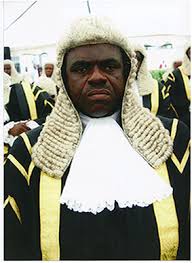
FHC CJ, John Tsoho.
By Editor.
Rt. Hon. Adeyemi Ikuforiji, born on August 24, 1958, is a Nigerian economist, banker, lawyer, businessman, politician, lawmaker and speaker of the 7th Lagos State House of Assembly from Epe Constituency 1 of Lagos
State. He also holds a doctorate degree of Liverpool Business School of the University of Liverpool, England, in Business Administration, majoring in leadership.
As the longest speaker of LSHA, his trial for money laundering started in 2012 as soon as he stepped down from office by the EFCC and the matter went to the Supreme Court of Nigeria, where it was ordered for retrial at the Federal High Court, Lagos.
He was rearraigned shortly before the Covid-19 lockdown in February, 2020 and thereafter the matter went comatose because the trial could not resume in the heat of the pandemic when the court was officially shut down.
But the Economic and Financial Crimes Commission (EFCC), on Wednesday, (yesterday) rekindled the trial and began to call its first witnesses in the money laundering trial of the former Speaker.
Ikuforiji is charged to account for N338.8 million alleged to have been siphoned through cash payments to him by the Assembly.
He is facing trial alongside his former Personal Assistant, Oyebode Atoyebi, on 54-count charge bordering on the offences.
They, however, pleaded not guilty before Justice Mohammed Liman and were allowed to continue on an earlier bail granted to them in 2012 when they were first arraigned.
On Wednesday, Mr Ekene Ihenacho appeared for the prosecution while Mr Dele Adesina (SAN) appeared for the defendants.
The prosecutor called the first witness, Mr Adebayo Adeniyi, an investigator with the EFCC.
The witness told the court that he had worked with the commission for 15 years, adding that his schedule of duty included investigation, search and any other duty relating to investigation.
He told the court that he had worked in the Intelligence and Special Operations unit of the EFCC from 2009 to 2012 and also in the Economic Government Department from 2012 to 2016.
The witness said that in June 2011, a petition was written against the first defendant for allegedly siphoning N500 million monthly from the Lagos House of Assembly.
He said that the EFCC went into investigation and visited the House of Assembly in Lagos
He said that from the office of the Clerk of the House, EFCC recovered some documents which were instrumental to their investigation, while the clerk was invited to the commission.
“We recovered some payment registers, and when we went through them, we discovered that a lot of cash payments were made to the second defendant, and we invited him to explain why the payments were made to him.
“He told us that the payments were meant for the first defendant, and when we interrogated the first defendant, he actually confirmed that the second defendant was collecting the monies for him,” he said.
The prosecutor then showed the witness a bulk of documents and asked him to identify what they were.
In response, the witness identified pages one to 12 of the documents as being the statement of the first defendant, pages 13 to 24 as the statement of the second defendant, and pages 25 to 237 as other documents recovered from the clerk’s office.
The prosecutor then sought to tender the bulky document numbered 1 to 237 before the court.
Defence counsel did not oppose it.
The court admitted the statements of the first and second defendants as Exhibit A, B and B1.
The court admitted a search bundle as Exhibit C, a cash release register ETD as Exhibits D, a document tagged Chiko Bulk 2010 E, and another bulk document as Exhibit E1.
The prosecutor then asked the witness to narrate to the court his findings from the investigation conducted.
According to the witness, the EFCC discovered that series of cash payments were made to the second defendant, which were above the threshold allowed by the Money Laundering Act.
When prompted to demonstrate portions of such payments, the witness said that in Exhibit E, from the transaction of April 30, 2010, the sum of N3 million was collected by the second defendant on behalf of the first.
“On April 27, 2010, N10 million was collected in cash by the second defendant, while on May 6, 2010, the cash sum of N1.7 million was also collected by the second defendant on behalf of the first,” he said.
Meanwhile, Justice Liman queried this pattern of examination by the prosecution, on the grounds that it was not the duty of the witness to “speak” to the document in the manner done.
The court noted that such manner of examination was only wasting the time of the court, since the prosecution would also speak on same document during addresses.
He urged parties to make progress in the case which, he also noted, had spanned a period of almost 10 years since 2011.
The prosecutor asked for an adjournment to enable him to do some arrangements of the documents to be tendered.
Defence counsel did not oppose the prayer for adjournment.
Justice Liman fixed October 14 for continuation of trial.
The defendants were first arraigned on March 1, 2012, before Justice Okechukwu Okeke on a 20-count charge bordering on financial misappropriation and money laundering.
The defendants were, however, re-arraigned before Justice Ibrahim Buba, following re-assignment of the case.
Buba had granted them bail in the sum of N500 million each with sureties in like sum.
On September 26, 2014, Buba discharged Ikuforiji and his aide of the charges, after upholding a no-case submission by them.
Buba had held that the EFCC failed to establish a prima-facie case against them.
Dissatisfied with the ruling, the EFCC through its counsel, Mr Godwin Obla (SAN), filed the Notice of Appeal dated September 30, 2014 challenging the decision of the trial court.
Obla had argued that the trial court erred in law when it held that the counts were incompetent since they were filed under Section 1(a) of the Money Laundering (Prohibition) Act, 2004, which was repealed by an Act of 2011.
EFCC further argued that the lower court erred in law when it held that the provisions of Section 1 of the Money Laundering (Prohibition) Act, 2004, and 2011, only applied to natural persons and corporate bodies other than government.
The commission had also submitted that the trial judge erred in law when he held and concluded that the testimonies of the prosecution witnesses supported the innocence of the respondents.
In its judgement, the Lagos Division of the Appeal Court, in November 2016, agreed with the prosecution and ordered a fresh trial of the defendants before another judge.
Following the decision of the Appeal Court, the defendants headed to the Supreme Court, seeking to overturn the ruling of the appellate court.
In its verdict, the apex court also upheld the decision of the appellate court and ordered that the case be sent back to the Chief Judge of the Federal High Court for reassignment.
According to the charge, the EFCC alleged that the defendants accepted cash payments above the threshold set by the Money Laundering Act, without going through a financial institution.
The commission accused the defendants of conspiring to commit an illegal act of accepting cash payments in the aggregate sum of N338.8 million from the House of Assembly without going through a financial institution.
Ikuforiji was also accused of using his position to misappropriate funds belonging to the Assembly.
The EFCC said that the defendants committed the offences between April 2010 and July 2011.
The offences, according to the EFCC, contravene the provisions of Sections 15 (1d), 16(1d) and 18 of Money Laundering Act, 2004 and 2011.
………………………………………………………………………….
QUOTE OF ALL TIMES ON RULE OF LIFE:
The rule of life is to be found within yourself,
Ask yourself constantly, “What is the right thing to do?”
Beware of ever doing that which you’re likely, sooner or later, to repent of having done.
It is better to live in peace than in bitterness and strife…
The superior man does not wrangle. He is sociable but not clannish and sets a good example to his neighbours.
By celebrated Chinese Philosopher, Confucius, who died in 478 B.C.
………………………………………………………………………….
We are open to business:
Support our efforts, patronize our publications by placing your commercials and advertisements with us. We offer the best returns because of our reach. Thank you for doing business with TAN.




